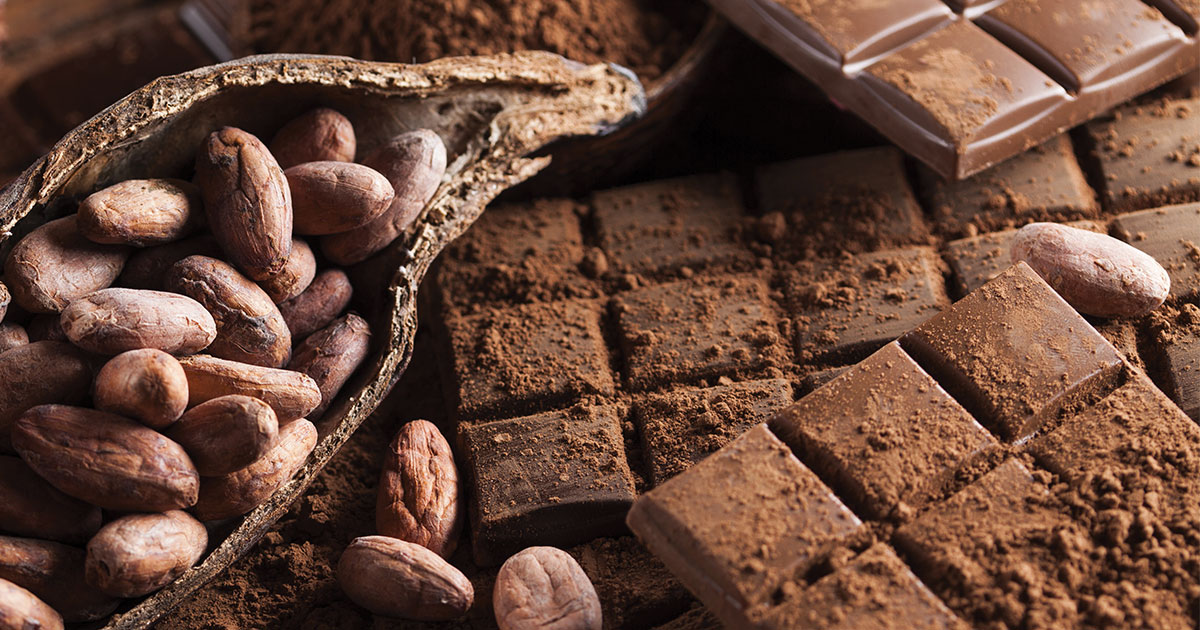From the seed of the cocoa tree comes chocolate, an antioxidant-rich treat to savor and enjoy. Chocolate! It’s rich, melts in your mouth and has just the right amount of sweet to satisfy your sugar cravings. Who knew that such a delectably delicious and sweetly sumptuous candy could also be really healthy for you? For those who like a healthier sweet treat, get rid of the guilt and indulge in a piece of dark chocolate.
NUTRIENT-RICH
A fan of chocolate? Want to know why this candy is so packed with nutritional health benefits? You can enjoy one ounce or so of chocolate a couple times a week to reap the best of benefits from your favorite sweet treat.
Dark chocolate is nutrient-rich and includes a soluble fiber and also contains iron, magnesium, copper, manganese, and potassium. A 100-gram bar of dark chocolate with 70–85% cocoa containsplenty of potassium, phosphorus, zinc and selenium. Dark chocolate is also filled with organic compounds, such as antioxidants, polyphenols, flavanols and catechins.
CAFFEINE IN CHOCOLATE
Dark chocolate does contain caffeine, though a smaller amount when compared with the caffeine in coffee, but caffeine is only found in traces in milk chocolate. Cocoa contains the stimulant substances, caffeine and theobromine, which may be why dark chocolate is believed to improve brain function in the short term.
THE HEALTH FACTOR
We know it’s yummy, but is it really healthy? That’s what they say! From increasing your circulation to preventing depression, diabetes, cardiovascular disease, and stroke, the pros far outweigh the cons. Dark chocolate can also lower blood pressure and reduce cholesterol.
Chocolate is shown to support a healthy brain and reduce the risk of cognitive decline. One study of healthy volunteers showed that eating high-flavanol cocoa for five days improved blood flow to the brain. The flavonols in dark chocolate can protect against sun damage, improve blood flow to the skin and increase skin density and hydration.
Dark chocolate can reduce insulin resistance, which is a precursor for diabetes and heart disease. It may also reduce the risk of heart disease, while causing much less cholesterol to form in the arteries. The fat in chocolate comes from cocoa butter and is made up of oleic acid, a heart-healthy monounsaturated fat also found in olive oil.
A study revealed that eating chocolate two or more times per week lowered the risk of calcified plaque in the arteries by 32%. And, another study showed that eating dark chocolate more than 5 times per week lowered the risk of heart disease by 57%.
A BRIEF HISTORY
Historically, Mayan and Aztec civilizations valued chocolate (cacao) as a “gift from the gods.” The passion for chocolate began when it was a highly prized, strong, hot, and bitter drink. Chocolate was considered a luxury item and was a very expensive import. The cocoa press was invented in the mid-19thcentury and, subsequently, chocolate production become popularized, even revolutionized.
Richard Cadbury, of the English chocolate making family, invented the first Valentine’s Day candy box during the Victorian era, and Cadbury’s was the first chocolatier to promote giving heart-shaped boxes on this special occasion.
WHAT TO TRY
A lot of commercial chocolates are highly processed, so be sure to look out for chocolate that says “processed with alkali” because that process produces fewer flavanols.
Here are some brands of dark chocolate to try: Ghiradelli, Godiva, Lindt, Pascha, Endangered Species, Alter Eco, Taza, Green & Blacks, Pure7, Theo, ChocoLove, Palcari, Valrona, Amano, Moser Roth, Loving Earth, Vivani, Ritter Sport, Giddy Yoyo, Sharffen Berger, Righteously Raw, Sweet Riot, Lily’s, ChocZero, Notable Mentions.
GET GIFT GIVING
For Valentine’s Day, which one would you rather get as a gift? Red roses or dark chocolate? Go for dark chocolate if you want to benefit your health, and spread the love by sharing chocolate with your loved ones this Valentine’s.
And, get that happy feeling, almost like being in love, with the release of neurotransmitters like phenylethylamine and serotonin. Chocoholics, rejoice!





















